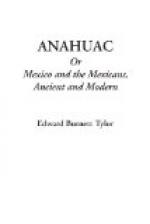him down, till the bull was tired out and no longer
resisted. Then they both lazo’d him over
the horns, and galloped him out, amid the cheers of
the spectators. The amusements finished with
the “colear.” This is quite peculiar
to Mexico, and is done on this wise. The coleador
rides after the bull, who has an idea that something
is going to happen, and gallops off as fast as he can
go, throwing out his hind legs in his awkward bullish
fashion. Now, suppose you are the coleador, sitting
in your peaked Mexican saddle, that rises behind and
before, and keeps you in your seat without an effort
on your part. You gallop after the bull, and
when you come up with him, you pull as hard as you
can to keep your horse back; for, if he is used to
the sport, as almost all Mexican horses are, he is
wild to get past, not noticing that his rider has
got no hold of the toro. Well, you are just behind
the bull, a little to the left of him, and out of the
way of his hind legs, which will trip your horse up
if you don’t take care; you take your right
foot out of the stirrup, catch hold of the end of the
bull’s tail (which is very long), throw your
leg over it, and so twist the end of the tail round
your leg below the knee. You have either got the
bridle between your teeth or have let it go altogether,
and with your left hand you give your horse a crack
with the whip; he goes forward with a bound, and the
bull, losing his balance by the sudden jerk behind,
rolls over on the ground, and gets up, looking very
uncomfortable. The faster the bull gallops, the
easier it is to throw him over; and two boys of twelve
or fourteen years of age coleared a couple of young
bulls in the arena, in great style, pitching them over
in all directions. The farmers and landed proprietors
are immensely fond of both these sports, which the
bulls—by the way—seem to dislike
most thoroughly; but this exhibition in the bull-ring
was better than what one generally sees, and the leperos
were loud in their expressions of delight.
When we had been a week or two in the city of Mexico,
we decided upon making an excursion to the great silver
mining district of the Real del Monte. Some of
our English friends were leaving for England, and had
engaged the whole of the Diligence to Pachuca, going
from thence up to the Real, and thence to Tampico,
with all the pomp and circumstance of a train of carriages
and an armed escort. We were invited to go with
them as far as Pachuca; and accordingly we rose very
early on the 28th of March, got some chocolate under
difficulties, and started in the Diligence, seven
grown-up people, and a baby, who was very good, and
was spoken of and to as “leoncito.”
On the high plateaus of Mexico, the children of European
parents grow up as healthy and strong as at home;
it is only in the districts at a lower elevation above
the sea, on the coasts for instance, that they do
not thrive. Mr. G., who was leaving Mexico, was
the head of a great merchant-house, and it was as a




